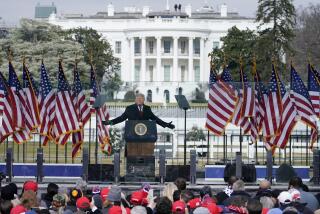Should the media demand that Obama not prosecute leakers?
The Committee to Protect Journalists has published an interesting overview of “The Obama Administration and the Press: Leak Investigations and Surveillance in Post-9/11 America.” Written by former Washington Post Executive Editor Leonard Downie Jr. and reported by Sara Rafsky, it’s a non-tendentious account of recent skirmishes between the government and the media, with due attention to the role of leakers such as Army Pfc. Bradley Manning and former CIA officer John Kiriakou, who pleaded guilty to identifying an undercover operative.
But the committee appends to its report a list of recommendations for the Obama administration that includes one suggestion bordering on the fantastic.
Here’s the list:
• Affirm and guarantee that journalists will not be at legal risk or prosecuted for receiving confidential and/or classified information.
• Be more forthcoming about the scope and nature of the National Security Agency and other surveillance activities as they are being applied to domestic and international journalists. Develop policies to limit surveillance of journalists’ communications to ensure the integrity of a journalist’s right to protect his or her sources.
• Implement revised Justice Department guidelines and prevent the filing of unnecessary, overly broad and/or secret subpoenas to obtain journalists’ records.
• End the practice of bringing espionage charges against people who leak classified information to journalists, which could create a severe chilling effect and thwart the free flow of information on matters of public interest.
• Make good on promises to increase transparency of government activities and end government intimidation of officials who might speak to the press. Enforce prompt and less restrictive responses to FOIA requests and more systematic and far-reaching efforts to reduce over-classification. Encourage administration officials to be open and responsive to press inquiries.
• Advocate for the broadest possible definition of “journalist” or “journalism” in any federal shield law. Any federal shield law should protect the newsgathering process, rather than professional credentials, experience or status, so that it cannot be used as a means of de facto government licensing.
As they say on “Sesame Street,” one of these is not like the others. Most of the requests involve greater transparency or protection for journalists from the prying eyes of investigators and prosecutors. This is standard stuff: For years, advocates of “shield laws” to protect reporters’ confidential sources have suggested that, though the government has every right to keep a tight ship, once material has leaked, reporters must be off-limits. Think of it as a division of labor: Reporters are free to try to obtain classified information, but the government is under no obligation to make it easy for them.
But look at the fourth recommendation above: “End the practice of bringing espionage charges against people who leak classified information to journalists, which could create a severe chilling effect and thwart the free flow of information on matters of public interest.”
Sure, it would be easier to protect journalists if the government never tried to identify a leaker, especially now that communications between leakers and reporters take place in cyberspace rather than in darkened garages. But, unlike a shield law, this proposal would mean that a leaker couldn’t be prosecuted even if the government fingered him by inspecting his emails or notes and never went near the reporter. It would even protect people who leaked material that a newspaper decided not to publish because it was a danger to national security (or false or libelous).
Even the George W. Bush administration was reluctant to use the Espionage Act to go after journalists (whereas the Obama Justice Department identified a reporter as a potential violator when it sought an order to look at his emails). But to say that freedom of the press requires that the government can’t investigate and prosecute its own employees strikes me as a lot to ask.
ALSO:
In medicine, more care may not be better
Miley Cyrus syndrome: Where have all the grown-ups gone?
GOP offer on debt ceiling may make Democrats be the grown-ups
More to Read
A cure for the common opinion
Get thought-provoking perspectives with our weekly newsletter.
You may occasionally receive promotional content from the Los Angeles Times.







